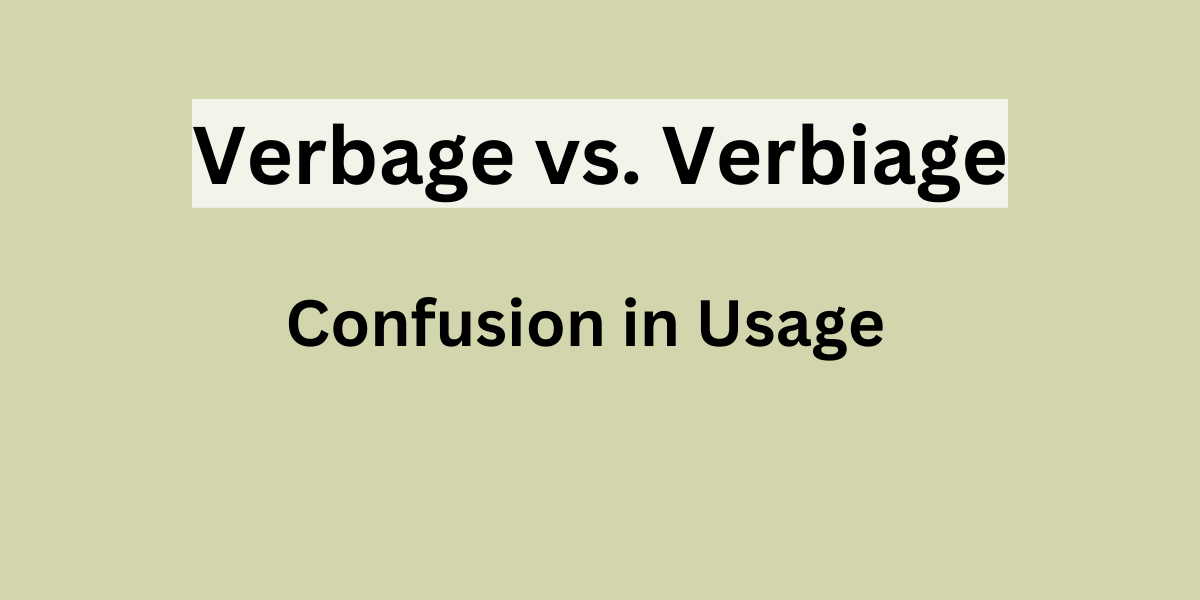Verbiage and Verbage are two words that often trip up English speakers due to their similar spellings and pronunciations. However, they have distinct meanings and should not be used interchangeably. Let us talk more about into details:
What is Verbage?
Verbage is not a word. Yes, you read that correctly – “verbage” is not a word. It is a common misspelling of the word “verbiage”. According to Dictionary.com, “verbage” is a deliberate misspelling and assimilation of “verbiage” with “garbage”. This means that “verbage” is essentially a non-word, and it is not recognized by dictionaries or linguistic authorities.
What is Verbiage?
Verbiage, on the other hand, is a noun that refers to spoken or written language that uses too many words. It can also describe the way in which something is expressed, including the wording or diction used. In the past, verbiage had a pejorative connotation, implying that the language was excessively wordy or verbose.
However, nowadays, verbiage is a more neutral term that simply refers to wording in general.
What’s the Difference?
Here is the difference between “Verbiage” and “Verbage”:
| Aspect | Verbiage | Verbage |
|---|---|---|
| Definition | Excessive or fancy words, often unnecessary | Incorrect term, often used mistakenly instead of “verbiage” |
| Usage | Used to describe overly wordy writing or speech | Not a standard word, often a mistake |
| Correctness | Correct and recognized term | Incorrect and not recognized in formal writing |
| Example Sentence | “The document’s verbiage made it hard to understand.” | “The document’s verbage made it hard to understand.” (incorrect) |
| Origin | Comes from French “verbier” meaning “to chatter” | Misinterpretation of “verbiage” |
Etymology and Usage
Verbiage:
- Etymology: The word “verbiage” comes from the French term “verbiage,” which means “wordiness” or “verbosity.” It first appeared in English during the late 18th century.
- Usage: Verbiage is the more established and accepted term in standard English. Use it confidently in formal writing or professional communication.
Verbage:
- Etymology: “Verbage” emerged as a rare variant of “verbiage” in the mid-20th century. It likely resulted from blending the words “verbiage” and “garbage,” leading to confusion.
- Usage: While “verbage” might crop up colloquially or informally, it is best to avoid it in formal contexts.
Common Mistakes
One of the most common mistakes people make is using “verbage” instead of “verbiage”. This is likely due to the similarity in spelling and pronunciation between the two words. However, it is essential to remember that “verbage” is not a word, and using it can make your writing or speech appear unprofessional or careless.
Related Articles
- 5353 Angel Number: Unlocking the Power of Transformation
- 1232 Angel Number: Your Sign to Rebalance and Recenter Your Life
- Balancing Boys, a Dog, and Homeschooling: Essential Tips for Busy Parents
- 01174411569: Could It Be More Than Just Numbers?
- Dating Antique Ice Boxes: Tips and Techniques to Unveil Their Past
Examples
Here are a few examples of how “verbiage” can be used:
- The company’s mission statement is filled with too much verbiage, making it difficult to understand their core values.
- The politician’s speech was criticized for its excessive verbiage, which seemed to be more focused on sounding impressive than conveying meaningful information.
People May Ask
Is “verbage” a real word?
No, “verbage” is not a word. It is a common misspelling of the word “verbiage”.
What does “verbiage” mean?
Verbiage refers to spoken or written language that uses too many words, or the way in which something is expressed, including the wording or diction used.
Is “verbage” a synonym for “verbiage”?
No, “verbage” is not a synonym for “verbiage”. “Verbage” is not a word, while “verbiage” is a noun with a specific meaning.
Can I use “verbage” in my writing or speech?
No, it is not recommended to use “verbage” in your writing or speech. Instead, use the correct word “verbiage” to convey your intended meaning.
How can I avoid using “verbage”?
To avoid using “verbage”, make sure to proofread your writing and speech carefully, and use a dictionary to check the spelling and meaning of words.
Conclusion
In conclusion, “verbage” and “verbiage” are two words that are often confused with one another. While “verbage” is not a word, “verbiage” is a noun that refers to spoken or written language that uses too many words. By understanding the difference between these two words, you can improve your writing and speech, and avoid common mistakes.
Remember, it is essential to use the correct word to convey your intended meaning, and to proofread your work carefully to avoid errors.

I am a passionate technology and business enthusiast, constantly exploring the intersection where innovation meets entrepreneurship. With a keen eye for emerging trends and a deep understanding of market dynamics, I provide insightful analysis and commentary on the latest advancements shaping the tech industry.
